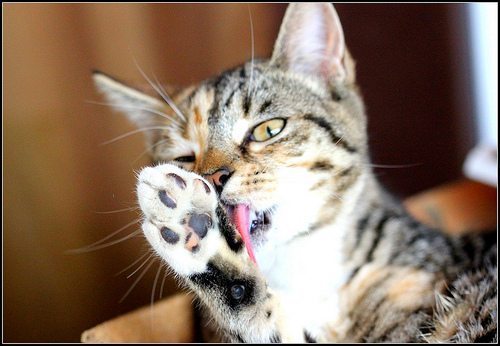By Nicky LaMarco
Whether you are a first time cat guardian, or a very experienced feline lover, you could be stumped by the very same question – why does my cat drool? Should I be worried about it when he does? Does drooling mean that my cat is sick in any way? Is this normal behavior for cats?






Drooling is normal behavior, but not all cats engage in this messy action. Some cats almost slobber when being petted, while others never display this type of behavior. What is the difference? What makes one cat drool while another does not?
Possible Medical Issues
If your cat drools for an extended period of time, say for a half hour or more, then there may be a medical issue, and you should see a veterinarian as soon as possible. It is also a cause of concern if your cat is drooling without any of the triggers we talk about below. It is also concerning if your cat shows other symptoms in conjunction with the drooling.
Non-stimulated drooling could have one of two medical origins. There could be a systemic issue within the body, or there could be a dental issue in the mouth. Nausea and pain can be non-pleasure triggers for this drooling. Any condition that might interfere with the process of swallowing can also stimulate drooling.
If the problem is dental, you might notice that your cat has additional symptoms such as bad breath, eating difficulties, or not wanting their usual food. They may also have some blood in the saliva.
Dental Causes for Cat Drooling
These types of mouth issues might also give rise to cat drooling:
- Cyst in the salivary gland
- Periodontal disease or gum disease and stomatitis
- Abscessed teeth, decayed or broken teeth
- Insect sting
- A mass in the mouth such as a tumor or eosinophilic granuloma
- Something caught in the cat’s mouth like a bone, a hook or string
- An ulcer of the mouth or a laceration of the mouth
If the problem is systemic, and not dental, you might look for things like :
- Exposure to a toxin of some sort especially anti-freeze or rat/mice poisoning
- Rabies
- Exposure to caustic chemicals
- Late stage kidney disease
- Liver disorder Portosystemic Shunt (rare)
- Blockage of intestines, stomach and esophagus
- Some insecticides and some flea dips or collars – be very careful with these
You should get your cat to the vet as soon as possible if you suspect any of these things:
Cats Drool When They Are Happy
Those cats that do not have any medical issues causing their drooling are doing it in response to the stimulation of pleasure triggers. Some cats drool while purring. Others will drool when sitting on your lap and being petted or massaged. Some of the basic pleasure triggers for cats are behind the ears, head, chin and neck.
Cats drool when they are happy and relaxed. When their pleasure sensors are triggered they relax, their mouth falls open and they drool while purring. For most cats, this pleasure response drooling is very much an automatic response. It is much like the automatic response humans have when we are hungry and we smell odors that trigger our food sensors. We salivate. It is a Pavlovian response.
Because of this explanation, the real question might be why don’t all cats drool? Why is it only some cats that drool? The answer to this question is unknown. The reaction these cats have is very similar to the reaction some cats have to cat nip. Some cats will drool after exposure to cat nip. Perhaps these are the same cats who do not drool? We do not know why this would be true. We only know it is true.
Is Your Cat Scared?
Some cats salivate and drool when they are scared as well as when they are happy. Cats who hate traveling will drool in the car. Cats that are afraid of the vet will drool at the veterinary clinic. Some cats get motion sickness when riding in the car and they will drool then. Hairballs can cause cats to drool as well.
In all of these cases, and even with the happy drooling, it is short-lived. It will only last a few minutes, or the length of time the activity is going on. For instance, if your car ride is about 10 minutes, then your cat might drool for 10 to 15 minutes. Even pleasure drooling should not last more than 10-15 minutes.
To sum it up, there could be a variety of reasons why your cat drools, and it is important to know when to rush your cat to the vet and when not to. Drooling is a peculiar thing to do. Ensure your cat is healthy by making an appointment with the veterinarian just to be safe.
Photo: Courtesy of cuatrok77 via Flickr (CC by 2.0)
